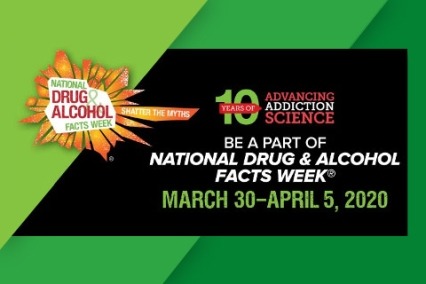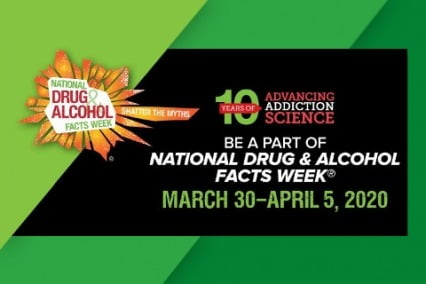National Drug and Alcohol Facts Week Celebrates Its 10th Year
mfleming
Sat, 03/28/2020 - 16:15
This week, March 30 through April 5, 2020, is the 10thNational Drug and Alcohol Facts Week® (NDAFW), a yearly observance organized by NIDA in partnership with the National Institute on Alcohol Abuse and Alcoholism (NIAAA). Restrictions on physical gatherings due to concerns over COVID-19, including schools’ transition to distance learning, have forced the cancellation of in-person NDAFW events this year. But online activities across the country will still link teens with scientific experts, to help young people make better choices about their health by arming them with scientific information about substances and substance use.

Since we first started in 2010, NDAFW has grown in size and scope. Last year, schools, community groups, and prevention organizations held or organized nearly 2,000 events in all 50 states and in 20 countries. For instance, in 2019 more than 100,000 young people participated in the National Drug & Alcohol IQ Challenge—an interactive quiz they can take again this year on their mobile devices (in either English or Spanish).
Social media events this year include a Tweetstorm on Monday, March 30 from 3 to 4 p.m. EDT, when students and organizations can tweet about their NDAFW activities. On Friday, April 3, at 3 p.m. EDT, there will be a Twitter Trivia Challenge hosted by NIDA in partnership with Students Against Destructive Decisions (SADD). For both of these events, use the hashtag #NDAFW.
The popular National Drugs and Alcohol Chat Day has unfortunately been cancelled this year, but we hope and expect to resume that live interaction between students and NIH scientists again next year. (You can also read the transcripts of past chat days.)
Teens are smart and capable of making the right choices for their health, especially when they are equipped with the facts. The annual Monitoring the Future survey has shown consistent declines in most forms of drug, alcohol, and tobacco use by teens—suggesting that increased education about the dangers of drugs can have an impact.
One worrying exception to these declines is teen vaping, including vaping of nicotine and marijuana products. Not only are those substances addictive and likely harmful to adolescent brain development, there is also evidence that vaping can harm the lungs and impair their ability to respond to infection. Given the current threat of COVID-19, anything that compromises respiratory health may potentially increase susceptibility to the virus and its sometimes life-threatening complications. Thus, it is especially important amidst the current COVID-19 pandemic that teens learn the facts about vaping.
I am proud that for ten years we at NIDA have facilitated interactions between teens and scientists. We learn from the questions we receive from teens and we hope that our scientists have a positive effect on young lives. The first National Drug Facts Week was held in 2010. Later, in 2016, NIAAA partnered with NIDA so that the event could cover alcohol as well as drugs.
See the NDAFW homepage for more information about this year’s virtual NDAFW events.

Let's set some facts straight for the teens
on April 20, 2020
Yes, it IS reassuring as you say, "The annual Monitoring the Future survey has shown consistent declines in most forms of drug, alcohol, and tobacco use by teens—suggesting that increased education about the dangers of drugs can have an impact." And with certain caveats, of course.
Thanks in large part to efforts from organizations such as NIDA, I'm sure, but also I imagine that an older generation that went through the primary 'drug movement' of mainstream America some 50 years ago has passed on hard-earned wisdom to their offspring.
In fact, I recall how much of this happened while as a teenager visiting the modern illegal drug movement's ground-zero- San Francisco's Haight/Ashbury in 1967. Not as a participant, but as a visitor to see relatives.
Utterly shocking was the degree of drug abuse, addiction clinics and so forth. When I returned home, I thought I would tell others about the disaster there. But instead of being appalled, many found the movement entertaining and something to be exalted. The media sold it to our society as the "Summer of Love", carefreeness, music and free-love.
The reality was that event was the "Summer of Drugs". Ever since, unfortunately, much of mainstream America, mostly among progressives, developed a fascination with psychedelics, getting high and alternative states of reality.
And now look at all the problems we have because of it- drug-related crimes, murdered cops, ruined lives, some $750 billion lost yearly. The grandest stupidity ever. I do hope future historians get this right.